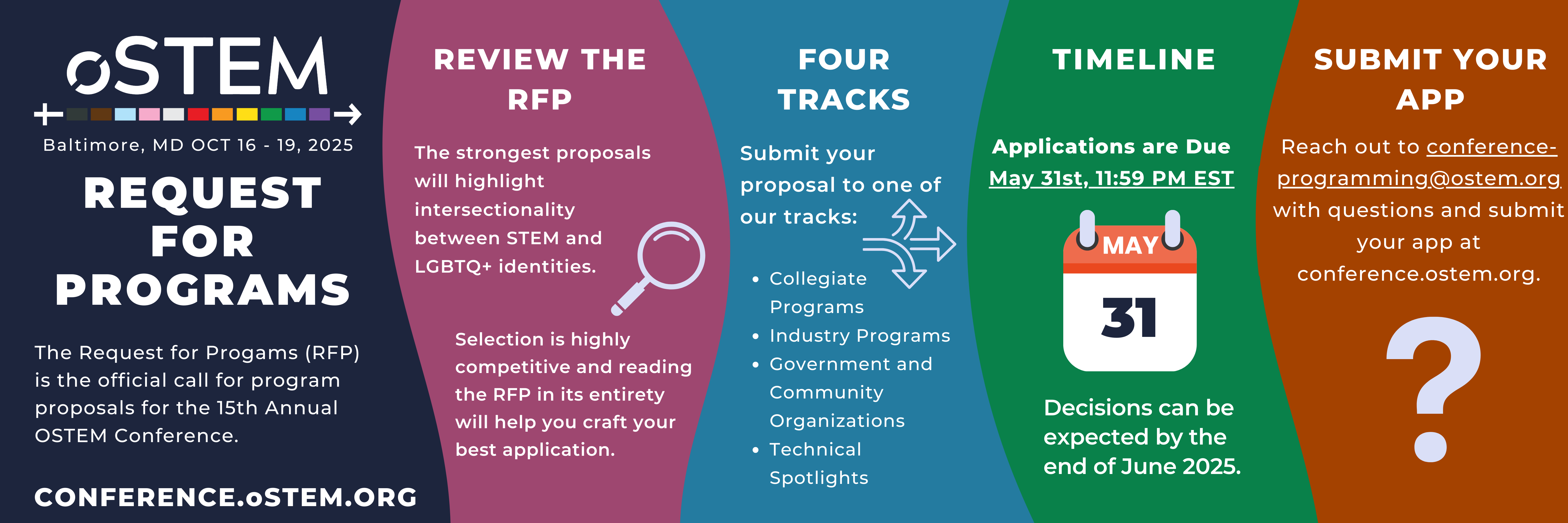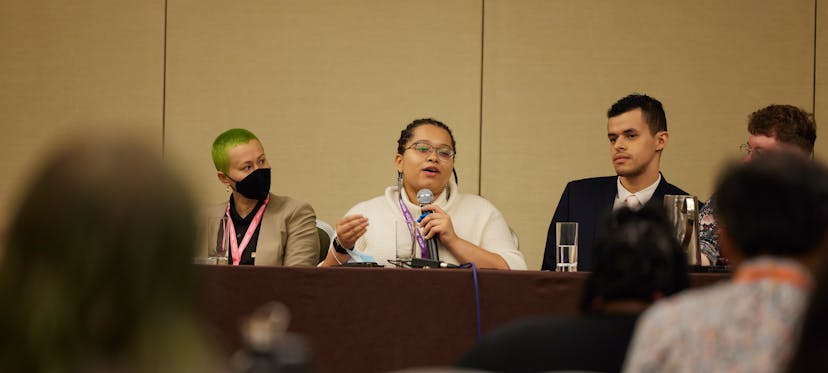Requests for Programs

Submission Milestones
Program proposal submissions for the 15th Annual oSTEM Conference are closed.
Successful programs will align with oSTEM’s mission and core values: integrity, intentionality, respect, passion, and grit.
- Wednesday, March 5th: Request for Programming Released
- Sunday, June 22nd: Deadline for Submissions
- TBA: RFP Decision Notifications
2025 Program Tracks and Updates
Based on previous feedback, oSTEM is excited to introduce four tracks for the 2025 Conference: Collegiate, Industry, Government and Community Organizations, and Technical Spotlight. Please read a little bit about each track in order to decide which track is best suited for your submission. All submissions are expected to be in workshop format. Workshops are defined as 1-2 speakers presenting on a program topic. All workshops are expected to be 50 minutes.
Collegiate: This track is focused for individuals who regularly interact with a student population or hold positions that are based in academia. Submissions for this track will be applicable to undergraduate, graduate, and faculty/staff positions in order to build a network of tools and resources to take back to the participant’s home institution.
Industry: This track aims to engage individuals that are currently in the workforce or are imminently prepared to enter the workforce. Potential workshop topics include how to better engage your employer, advocate for LGBTQ+ populations during your work day, build career-development skills, or shape your professional brand.
Government and Community Organizations: Programming in this track will focus on the intersections between science and society. Workshops should engage conference attendees who are current employees of or interested in working for nonprofits, community organizations, political thinktanks, and/or local, state, or federal government. Examples of topics for this track include the role of scientists in government agencies, science policy and law, and utilizing science in advocacy work.
Technical Spotlight: Topics for this track will be extremely focused on the highly technical aspects of the presented topic. Presenters will be professionals who already belong to this field or want to appreciate the intricacies of the field. These submissions are more focused and it is expected that the audience will have foundational knowledge of the topic being discussed. For the 2025 Conference, our programs will focus on AI and Machine Learning, Research and Study Design in LGBTQ+ Population, and Sustainable Engineering.
You can learn more about the four tracks below:
Collegiate Program Topics
Presentations are required to fall within the following categories:
- (1) Building Inclusive Spaces on Campus
- (2) Addressing Challenges at the Graduate School Level
- (3) Owning Your Identity On and Off Campus
- (4) Advancing in Academia
- (5) Managing Changes in Political Climate or Campus Policy
- and (6) Other Relevant Topics.
A description of each submission category is provided below:
Building Inclusive Spaces on Campus - Submissions in this category should be from either current students, young professionals who were involved in their oSTEM chapter at college, or current advisors of existing oSTEM chapters. These sessions will highlight success stories on how to build a community on a college campus.
Addressing Challenges at the Graduate School Level - Programs in this category will highlight the highs and lows of continuing education and explore strategies for success in graduate school. These programs will highlight the complete lifecycle of graduate studies: applying and deciding if graduate school is right for you, choosing a lab/PI, applying for funding and grants, budgeting, and how to establish professional relationships before looking for a job post-graduate.
Owning Your Identity On and Off Campus - Programs submitted in this category will describe different lived experiences in order to foster relationships outside the bubble of a college campus resource center. Workshops will explore different identities and how these identities can shape a college experience. These sessions would also encompass navigating difficult conversations with university leadership and how to make effective change on campus and in the broader community.
Advancing in Academia - Submissions will focus on next-steps to take when looking to stay in an academic setting. This may include but is not limited to: choosing a graduate program (PhD, JD, MD, PharmD), looking for a postdoc position, navigating conferences and workshops, effectively communicating your science, and applying for faculty positions.
Managing Changes in Political Climate or Campus Policy - Workshops in this category will focus on building resilience and skills to adapt to the evolving political landscape and institutional policy changes, especially those impacting the LGBTQ+ and STEM communities. Some potential topics include: developing actionable advocacy plans, ensuring our voices are heard in decision-making processes, and navigating hostile environments.
Other Relevant Topics - Interested in presenting something that doesn't fit into one of these categories? That's great! People don't always fit neatly into a box so we don't expect our programs to either. Feel free to submit a program that highlights STEM and LGBTQ+ populations in academic or relevant off-campus settings.
2025 Proposal Components
The strongest proposals will highlight intersectionality between STEM and LGBTQ+ identities. Program selection for our conference is highly competitive. Please follow the guidelines that have been outlined in this document to improve your chances of being selected.
Your submission will be evaluated based on the following:
- An engaging title and abstract
- Value to the LGBTQIA+ STEM Community
- Attendee Engagement
- A breakdown of your program that outlines the questions / topics you will be addressing
- Having experience and/or identity(ies) that support your program proposal
Please provide the following information (will not be used for evaluation):
- Is this session closed to members of a specific community only? If so, please specify.
- Please describe any additional technical services you may need.
- The standard room set-up includes a projector, HDMI cord, screen, microphones, and a table.
- For each presenter, please provide a name, contact information, and demographic information.
- Content warnings as applicable (for more information, check out this resource from University of Michigan)
Your proposal must include the following components:
| Proposal Components |
|---|
| Session Title 20 words max - Identifies program topic and how this relates to the oSTEM mission |
| Abstract for Program Book 500 words max - Provides a succinct description of the goals of the workshop and what participants will learn |
| What is the value of this workshop to the LGBTQ+ STEM Community? 500 words max - Describes and justifies the workshop's value - Establishes relevance to LGBTQ+ and STEM communities - States: What makes this program unique to this conference? |
| Session Outline 500 words max - Submits an outline of the presentation, approximating the amount of time spent on each question/topic, i.e., (20 minute talk on Topic X, 10 minutes of discussion, 10 minutes of questions, etc.) |
| Presenter identity & experience match the proposed topic - Demonstrates a basis of knowledge and relevant personal experience for this proposed program |

Benefits for Presenters
- 50% registration discount for selected presenters. Each selected presentation is
limited to 2 presenter discount codes.
- Add "Selected Talk for National Conference" to resume or CV
- Gain additional public speaking experience
- Increase visibility and networking opportunities with LGBTQ+ professionals and
recruiters in STEM
- Present on lived experiences and identities in addition to academic and
professional development topics
- Receive presenter acknowledgment in conference program book and on badge
Additional Info
For more information about the conference visit https://conference.ostem.org
For more information about oSTEM visit https://ostem.org
Note: If you are unable to access the submission form due to technical issues please contact conference@ostem.org prior to sending a document or email submission.
Please email our Conference Programming Committee at conference-programming@ostem.org with any questions.
For inquiries regarding available conference accommodations or to request this document in an accessible format, please contact the accessibility team at access@ostem.org.